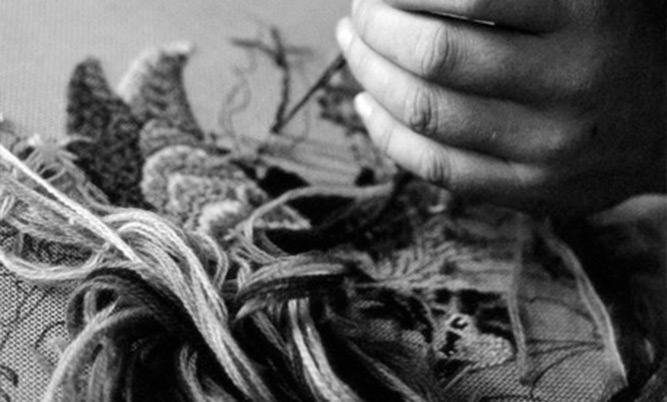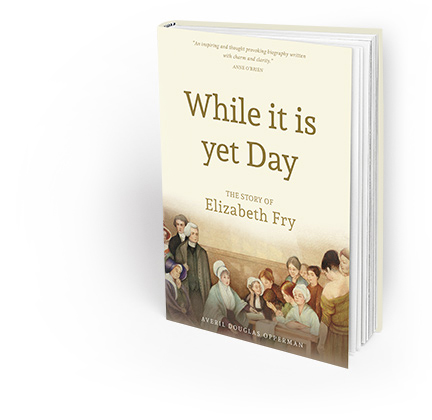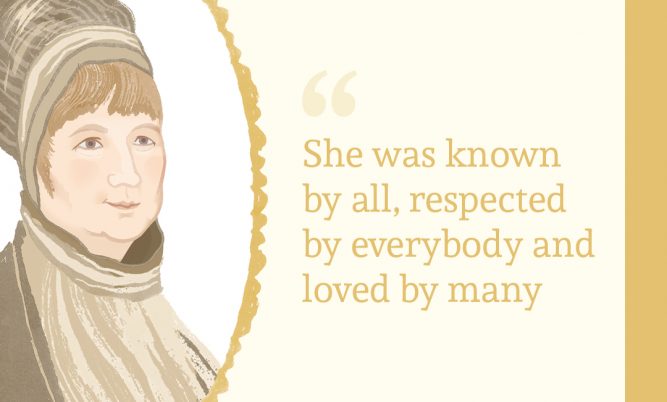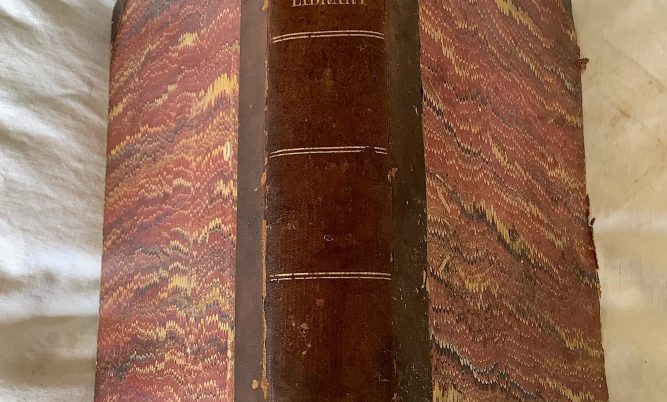Fine Cell Work is a social enterprise that trains prisoners in paid, skilled, creative needlework. The work they do is most definitely in the spirit of Elizabeth Fry and as such I was delighted to read their review of While it is yet Day.
Averil Douglas Opperman has written a heart warming and intimate book focusing on the wonder that was Elizabeth Fry as woman, wife, mother, friend, prison reformer, and deeply spiritual servant of God. There have been many books written about “Betsy” (as she was known to her family), but this book, as the author states, seeks to keep her wonderful story light as a means to appeal to young people.
Elizabeth was born in 1780, and died in 1845, aged 65. Spanning six decades and set against a turbulent backdrop of the French Revolution, the Napoleonic wars, and the beginning of the Industrial Revolution, Elizabeth’s life was certainly a memorable one. She even witnessed pioneers of her time build the first railways, and travelled on one from Liverpool to Birmingham in 1837. This shy young girl, the fourth child of twelve, was born to wealthy couple John and Catherine Gurney of Earlham Hall (Norwich) and had a humility that belied her privileged upbringing. We glimpse her profound faith via her written journals, and learn that she took personal inspiration from John’s Gospel, writing: “I must work the work of Him that sent me, while it is day” and “I think anybody who has real faith could never be unhappy” (1797). Furthermore, when Elizabeth was eighteen, she had experienced the preaching of American Quaker William Savery, whose words she described as “a refreshing shower on parch’d earth,” and her walk in faith lead to her becoming an “approved minister” in 1811.
She married at the age of twenty Joseph Fry, a banker also from a wealthy background. Together they had eleven children; Remarkably, her last child was born when she was 42, on the same day she became a grandmother. Even as a busy wife, mother, and finally, a grandmother, what she achieved throughout her life was truly extraordinary.
From an early age Elizabeth demonstrated a fervent desire to help others, carrying out significant acts of empathy and kindness. She took in groups of up to seventy poor and illiterate children (fondly known as ‘Betsy’s imps’), whom she read to and cared for. Married life in London exposed her daily to the acute poverty and lack of education children were experiencing in the early 1800s. In an overpopulated city of 15 million souls, disease was rife and the rapid development of machinery meant mass unemployment. She set up refuges in Cheapside, providing shelter for up to 700 people nightly. However, it was as prison reformer that she really excelled.
Newgate Prison in 1812 was a shocking place. Women were regularly shackled, and there was no proper food or medicine. She set about organising schools and training opportunities for prisoners and their children, who learnt to read and to stitch. During that time, prisoners were being transported abroad to serve their sentences. An estimated 165,000 male and female felons, including children, were transported to Australia between 1787 and 1868. Elizabeth often involved herself with the ships, and frequently helped inmates during their departure. She was highly successful in campaigning to change the law so that children under seven could accompany their mothers on the ships. She also aided the banning of taking prisoners in open wagons to the deportation docks, which involved much public abuse and heckling.
Having witnessed life inside a prison and actually staying there, Elizabeth was the first woman to give evidence to Parliament to protest against its appalling conditions. As a direct result of this intervention, the separation of the sexes in prisons, and the addition of women wardens, became law. Poignantly, she also addressed Parliament on the abolition of the death penalty, stating that punishment is “not for revenge, but to lessen crime and reform the criminal” and that no criminal was beyond “cure”.
Each woman who left on a convict ship was presented with a small gift before they left. Items included practical objects such as spectacles, thimbles, and bonnets, as well as Bibles. They were also given sewing materials, which meant that a quilt made on board could be sold in Rio de Janiero or Sydney to earn valuable income. On the voyage of HMS Rajah in 1834, not only was a magnificent quilt made (that now hangs in the National Gallery of Melbourne), but the captain also observed that the women performed “unceasing acts of kindness to each other.” There was always a typical library on board, and many women were able to read by the end of their journey. In her later years, Elizabeth travelled to Europe regularly to meet King Louis Phillipe of France and Frederick William IV of Prussia (who called her “The Angel of the Prisons”), and acted as an eminent ambassador for prison reforms in those countries.
One of her last altruistic acts was her founding of ‘Fry’s Nurses,’ an enterprise that appointed trained nurses to large London hospitals, and provided them with accommodation, good pay, and pensions. Many of the Fry’s nurses went with Florence Nightingale to aid victims of the Crimean War.
When Elizabeth died in 1845, over a thousand people attended her funeral in Barking. The amount of mourners in attendance is a true reflection of what a hugely important person she was to Britain, and how many lives she touched. This book is sympathetically written and brings the humble humanity of Elizabeth to life: passionate, sometimes fearful – but always faithful, and forever compassionate. There is no doubt that the reader is left basking in the warm after-glow of the power of human kindness. This work is a privileged insight into the life of a unique and truly remarkable person.
Jane Nairn
Prison Volunteer FCW
Craftwork in prison can help prisoners discover a more constructive and reflective side to themselves. They can learn new skills and help support their families with the money they earn. Fine Cell Work aims to broaden horizons beyond the prison walls, helping inmates to make a contribution by connecting them to wider society and giving them a brighter outlook on their future. Read more about Fine Cell Work.



